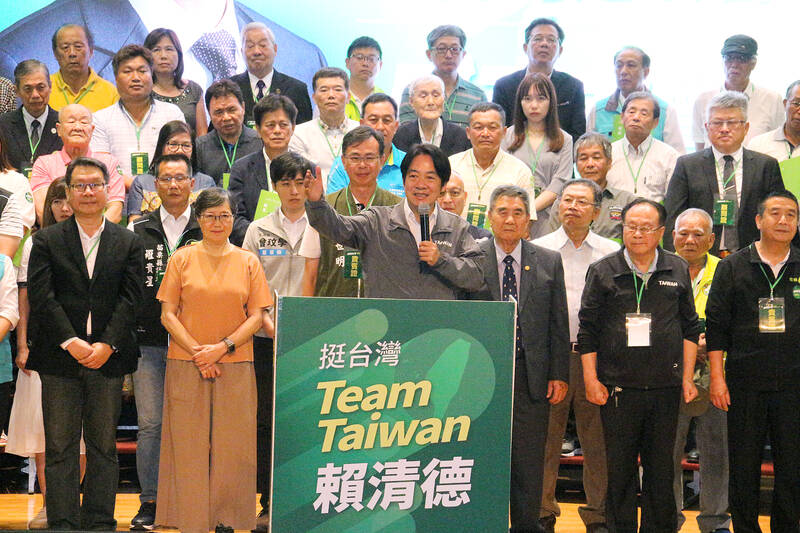Accepting Beijing’s “one China” principle and the so-called “1992 consensus” would be tantamount to Taiwan giving up its sovereignty, Vice President William Lai (賴清德) said in Miaoli County yesterday.
Lai, the Democratic Progressive Party’s (DPP) presidential nominee, made the remarks at the launch of a campaign group, while expressing his continued support for the “status quo” in the Taiwan Strait.
Taiwan would grow and move forward if it upholds its sovereignty, he said.

Photo: Tsai Cheng-min, Taipei Times
Taiwan would regress to autocracy if voters accept the “one China” principle or the “1992 consensus,” Lai said, adding that only when there is sovereignty is there true peace.
On Saturday, at another campaign event in Chiayi City, Lai accused China of fear-mongering about a potential war to lead Taiwanese to select a political party that it favors.
Lai urged Taiwanese voters to use their ballots to counter the Chinese Communist Party (CCP) in the presidential election scheduled for Jan. 13 next year.
If Taiwan lets China dictate its election results, it would be the end of the road for democracy, he said.
If a war breaks out, it would be because of a dictatorship, not the DPP, he said.
As Taiwan faces growing military threats from China, people have to take them seriously and not bow to the Chinese dictatorship, he said, adding that if Taiwan’s election results in the wrong choice, there would be no way to return.
The presidential election is not a decision between war and peace, he added.
The “1992 consensus” — a term that former Mainland Affairs Council chairman Su Chi (蘇起) in 2006 admitted making up in 2000 — refers to a tacit understanding between the Chinese Nationalist Party (KMT) and the CCP that both sides of the Taiwan Strait acknowledge that there is “one China,” with each side having its own interpretation of what “China” means.
The DPP rejects the “1992 consensus,” saying that agreeing to it implies acceptance of China’s claim over Taiwan. It has also drawn a parallel between the “1992 consensus” and Beijing’s “one country, two systems” formula for Taiwan, but there is no evidence that Beijing demands Taiwan to accept the latter for relations to be restored.
There has been a virtual freeze in cross-strait relations since 2016, when President Tsai Ing-wen (蔡英文) took office and rejected the “1992 consensus” that had underpinned closer cross-strait ties during the KMT administration of president Ma Ying-jeou (馬英九) from 2008 to 2016.

The manufacture of the remaining 28 M1A2T Abrams tanks Taiwan purchased from the US has recently been completed, and they are expected to be delivered within the next one to two months, a source said yesterday. The Ministry of National Defense is arranging cargo ships to transport the tanks to Taiwan as soon as possible, said the source, who is familiar with the matter. The estimated arrival time ranges from late this month to early next month, the source said. The 28 Abrams tanks make up the third and final batch of a total of 108 tanks, valued at about NT$40.5 billion

Two Taiwanese prosecutors were questioned by Chinese security personnel at their hotel during a trip to China’s Henan Province this month, the Mainland Affairs Council (MAC) said yesterday. The officers had personal information on the prosecutors, including “when they were assigned to their posts, their work locations and job titles,” MAC Deputy Minister and spokesman Liang Wen-chieh (梁文傑) said. On top of asking about their agencies and positions, the officers also questioned the prosecutors about the Cross-Strait Joint Crime-Fighting and Judicial Mutual Assistance Agreement, a pact that serves as the framework for Taiwan-China cooperation on combating crime and providing judicial assistance, Liang

A group from the Taiwanese Designers in Australia association yesterday represented Taiwan at the Midsumma Pride March in Melbourne. The march, held in the St. Kilda suburb, is the city’s largest LGBTQIA+ parade and the flagship event of the annual Midsumma Festival. It attracted more than 45,000 spectators who supported the 400 groups and 10,000 marchers that participated this year, the association said. Taiwanese Designers said they organized a team to march for Taiwan this year, joining politicians, government agencies, professionals and community organizations in showing support for LGBTQIA+ people and diverse communities. As the first country in Asia to legalize same-sex

MOTIVES QUESTIONED The PLA considers Xi’s policies toward Taiwan to be driven by personal considerations rather than military assessment, the Epoch Times reports Chinese President Xi Jinping’s (習近平) latest purge of the Chinese People’s Liberation Army (PLA) leadership might have been prompted by the military’s opposition to plans of invading Taiwan, the Epoch Times said. The Chinese military opposes waging war against Taiwan by a large consensus, putting it at odds with Xi’s vision, the Falun Gong-affiliated daily said in a report on Thursday, citing anonymous sources with insight into the PLA’s inner workings. The opposition is not the opinion of a few generals, but a widely shared view among the PLA cadre, the Epoch Times cited them as saying. “Chinese forces know full well that